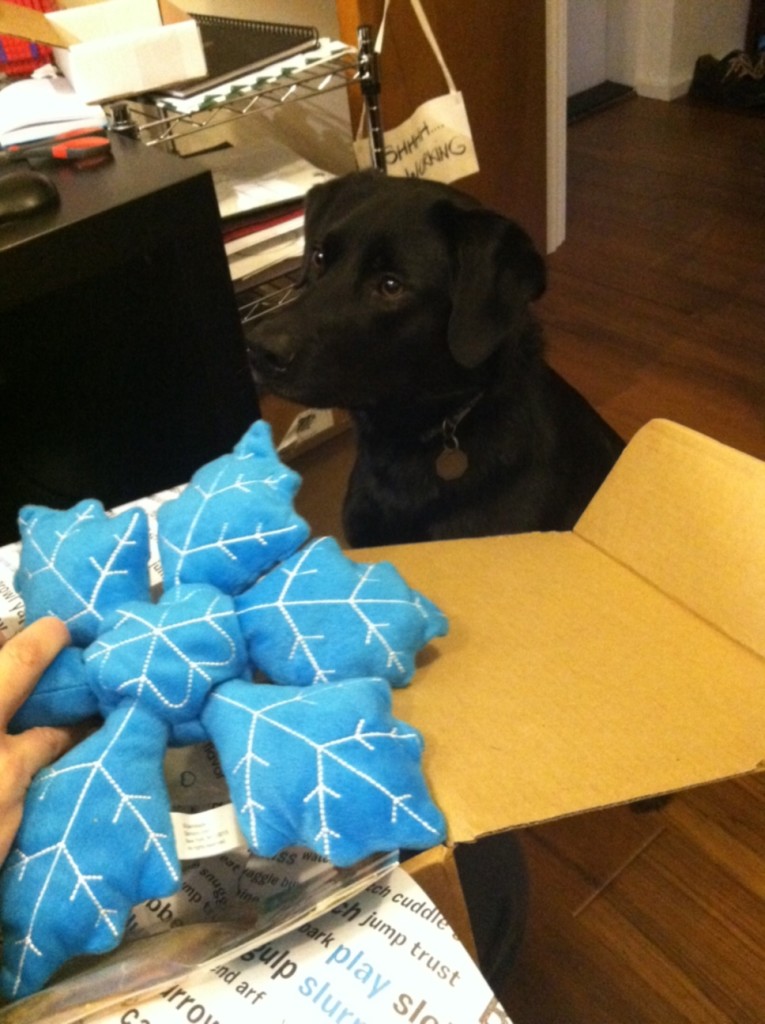
In the past month, I got the following things in the mail:
- A Barkbox, full of toys and treats for our puppy. We have a yearlong subscription and a box of random items gets delivered every month. Last month’s included a snowflake squeaky toy, stinky salmon strips, a chewy bone, and organic stew.
- A Stitchfix box, complete with 5 items of clothing that someone else picked out for me. Similar to the Barkbox, the Stitchfix box arrives on a designated schedule and I have no idea what’s in it until it shows up.
- Four or five Kickstarter deliveries, including Munchkin bricks, Bones miniatures, some temporary literary tattoos, and a couple of books. All of these were things I backed sometime last year.
- An item from The Mysterious Package Company. This was a gift for my partner, and I really had no idea what to expect when I ordered it.
What do all of these have in common? Well, obviously, they were delivered in the mail. But that’s not the thing I want to talk about (although that in itself is pretty interesting–I haven’t seen so many subscription-style mail-delivery options since the CD and book clubs of my teenage years).
But what I really find interesting is that all of these products are, first and foremost, about trust. I am trusting someone I’ve never met to choose items for me (or make items for me) and then deliver them to my house via the mail. I could go to the pet store and buy treats for my dog. I could go clothes shopping. I could wait for a Kickstarter product to be produced and then, if it’s successful, go pick it up at the local bookstore or gaming store, or buy it online. Instead, I take a risk on something unseen, unknown.
Of course, the examples I listed aren’t the only ones out there — there are still music and book clubs, there are clothing options for men and kids, there are cat boxes and jewelry boxes and, of course, Kickstarters and other types of crowdfunding projects galore.
When I co-wrote Kicking It: Successful Crowdfunding with Monte Cook, we talked a lot about how crowdfunding is primarily a trust business. Do you trust the creator to make a great product and deliver it on time? Have they done other successful projects? On the other side, as a crowdfunding creator, have you made it possible for potential backers to trust you by providing amazing products in the past? By delivering as much as or more than you promised?

I find it interesting that in most shopping experiences, the buyer won’t trust the creator of the product, but they will trust a random, unknown person who loves or hates said product. I do it too. I go to Amazon and look at a book by an author I love. If I’ve enjoyed the author’s previous work, I should just trust that the new book will also be something that I’ll enjoy, right? Instead, I read the reviews of random strangers, strangers that may or may not share my reading interests, strangers who may or may not have anything in common with me. Strangers who may NOT HAVE EVEN READ THE BOOK they are reviewing. And I am swayed by their responses. SWAYED. Sometimes away from an author that I already know and trust.
This is also true of companies. If I want to buy a pair of boots online–even from a company that I know and trust–I read the reviews. I look at what people say about the fit, the feel, the look. And then I decide whether to buy or not.
In that case, why do I trust a random stranger over someone who I already know is skilled in their craft? I think this has a lot to do with the advent of buying things over the Internet. When I go to the bookstore, I can read a sample and make up my own mind. When I go to the shoe store, I can feel the shoe and try it on. Walk around in it. When I buy things online, I have a photo. Maybe a little write-up. That’s it. So I look for someone else to help me decide whether the product is something that I want or not.
Yet, with things like Kickstarter and Barkbox, I am trusting the creators implicitly. I am essentially giving them my money and saying, “I believe you will send me something awesome. Surprise me.” It’s an entirely different way of purchasing things. It isn’t as though one is cheaper or less important. A Barkbox and a Kindle book cost about the same. I have backed Kickstarters for more than I have spent on boots.
So why am I willing to trust the creators with one but not the other?
Perhaps it has to do with taking a safe risk. There’s something exciting about opening the Barkbox each month and seeing what new toys and treats someone else chose for the puppy. I get a tingle of fear and nervousness when I am about to dive into a Stitchfix and see what clothing might soon join my wardrobe. I love the excitement of backing a Kickstarter and watching it grow and then much later (sometimes long after I’ve forgotten about it) getting a goody box of a brand new thing in the mail. Being surprised–sometimes for good, sometimes for bad–is part of the shopping experience. It’s a calculated risk that sometimes really pays off.
Perhaps it also is a return to something that has almost entirely disappeared in our shopping experiences: A direct connection to the creator of a product. Or at least the perception of a direct connection. When I back a Kickstarter, I am backing the person behind it as much as the product. I believe that the people who run Barkbox truly love dogs, and that they will choose good things for my own dog. I like the creative minds and talented artists behind The Mysterious Package Company, and I want to support their unique concept (while also giving someone I care about a cool gift).
On the other side, I truly believe (or at least really, really hope) that people who back the Kickstarters that we put together feel connected to us as people. That they trust us, and feel safe in our hands. That they enjoy the products we make, but that they also like and support our business and life philosophies. We are selling products, yes, but hopefully the quality of those products and of the experience are also helping build real relationships between us and our buyers.
The hard part about this is that trust is tenuous, and can go sour very quickly. If you go to the store and purchase a dog toy and your dog hates it or it falls apart, you’re sad and maybe mad at the company (or yourself for your choice), but there are other dog toys and other companies and it’s no big deal.
BUT: if you trust someone else to pick a dog toy and your dog hates it or it falls apart, you feel like they have broken that trust. Even if it’s the exact same toy and the exact same issue that you had with the toy you picked yourself, it suddenly has a big emotional impact. Because in your mind, someone you trusted failed you.
Even though it’s full of pitfalls, that emotional dynamic, that consumer relationship based on trust, might actually be a good thing for both the consumers and the quality of products. If I am creating a product and a business built on trust, then I damn well better do my best to keep that trust. I better make awesome things, create strong connections, and deliver every single time. That knowledge, that understanding that people are trusting me, drives me to do better, to crush expectations, because I hold that trust sacred. Not just as a business person, but as a human being. Trust is hard. It’s scary and dangerous. Even when it’s just a business transaction. There’s a reason that we no longer do business on someone’s word and instead have contracts and legal documents. It’s because every time that trust gets broken, it makes us wary. Because it hurts to have someone break your trust, even if they didn’t mean to.
I like to believe in the good of people. In their kindness and competence and honesty. Maybe in the end, that’s why I seek to create trust relationships with creators, businesses, and my own customers. I want to be surprised and delighted by the world. I never want to outgrow the promise of the unknown. Maybe it’s a way to say, “Yes, I still believe in the goodness of other humans despite the bad. Yes, I will take the risk and trust you because I don’t want the cynicism to win.”
I also want to be the kind of business owner who gives people a reason to trust and believe. I want anyone who gets one of my products to feel the delight of opening their package and being blown away by what’s inside. I want them to rejoice in the trust they put in me, to feel smart and awesome about believing in the promise of honesty and quality.
Trust. Excitement. Creating connections. Saving the world. Making my ass look amazing in new jeans. Okay, maybe that’s too much to ask of a little brown box with a mailing label on top. But I don’t think so. Do you?
Kiss kiss bang bang, s.

Amen. A conundrum of sorts, that a somewhat cynical aging person such as myself, would continue to seek out the trust (perhaps not even realizing it until it is pointed out to him). However, so far, it seems the times it works prevails over the times that it does not. Such a tenuous, fragile thing, this trust.
That being said, I wanted to thank you, Shanna (and Monte) for NOT failing that trust. You guys rock! 8′)
Pingback: Does There Need To Be More Federal Regulation Or Private Insurance In The Electric Fatbike/Crowdfunding World? | Electric-FatBike.com